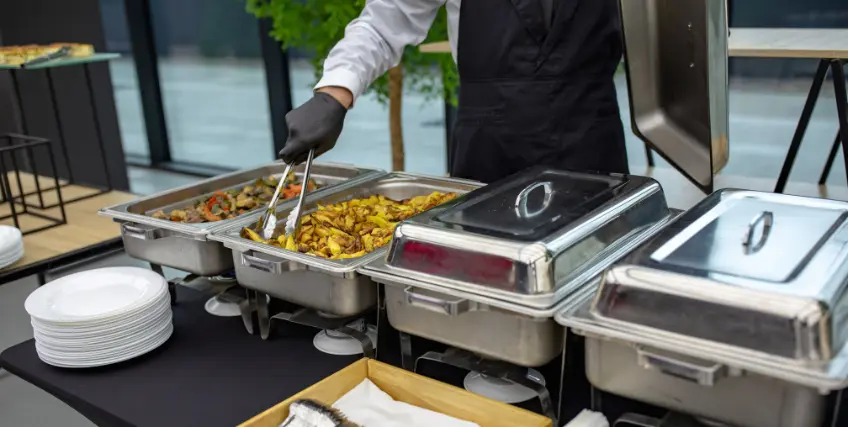Want to Start a Catering Business? Here's What You Need to Know
March 19, 2025 | Last Updated on: March 19, 2025

If you are an entrepreneur and love food, it's natural that you might consider following your passion to start a catering business. The catering industry is a $60 billion business in the U.S., and it is forecasted to grow more than 7% annually through 2030. Small business owners who take advantage of this opportunity can make a lot of money. However, you might also be concerned about the funding options for your food business and how to set up your commercial kitchen to comply with existing regulations. Learn how to start your own catering business, what to include in your catering business plan, financing options for your startup, and other catering business ideas to help you reach your potential.
What is a Catering Business?
A catering business is a food service company that prepares large orders of food, usually for events or singular occasions. The company starts by receiving an order, negotiating a price for the order, cooking the order, and possibly delivering and serving the order to customers.
Types of Catering Events
When you start a catering business, there are many types of events for which you can provide services. Whether you offer catering for business events or personal celebrations like weddings, family reunions, and parties, there is significant demand for catering services. While some catering businesses cater to whoever calls for an order, others cater to a specific type of event. This can help some catering businesses specialize in their food or services.
As you get closer to building your catering business, you should consider the exact type of event that you want your catering business to serve. You do not have to limit yourself to just one, but it may be useful to consider if specialization is worth it for your catering business.
Types of Food and Drinks on the Menu
Catering businesses usually cater to a specific type of event or all events. They also typically serve a kind of cuisine on their menu, such as American, Mexican, or other dishes. However, you should consider limiting your menu to a handful of foods that are easy to make quickly and have a higher profit margin. This allows them to save on costs by not having to serve all kinds of food. Moreover, employees can be trained to make one type of food or a specific array of dishes very well.
Catering businesses, however, will usually serve many kinds of dishes to an event they are catering to. Such dishes will likely include appetizers, entrees, desserts, and drinks. That way, a catering business can be a one-stop shop for all the catering needs of an event. You might consider the dishes and drinks you will provide for your catering business.
Project Your Costs
Once you have planned out your menu and understood the purpose of your catering business, it is time to start projecting the costs of the business. Your new business will have a variety of setup and ongoing costs that you will have to pay. Anticipating startup costs determines the financing that you may need or the impact the business setup will have on your own financial situation.
- Space For Your Catering Business: Should you buy or rent a commercial kitchen? This space will likely be the center of all food production, packaging, and then shipping to the location you need to serve the food. Remember that the amount of space you rent should be larger than you anticipate, needing to provide you with room for growth.
- Packaging Materials: How will you package the food, and how will customers eat it? Consider the cost of containers to transport the food, and the items needed during the event, like plates, cups, hot plates, serving spoons, and utensils.
- Equipment: What equipment will you need to cook and prepare the food? Having the right ovens, stoves, grills, and other relevant pieces of equipment ensures you can quickly prepare dishes in the right quantity to serve your customers.
- Delivery Methods: How will you transport the food from your kitchen to your customer's location? You may need to purchase or lease a delivery van or similar vehicle to transport the food.
- Wages: When you start a catering business, you'll most likely need to hire employees to prepare or serve the food. Depending on how many customers you have, you can hire contract workers on a per-job basis until you can afford to hire part-time or full-time employees. If you hire employees, you're also responsible for employer taxes, workers' compensation insurance, and other costs.
- Business Insurance: Business insurance protects you against lawsuits. There are many different types of insurance, including liability insurance and workers' compensation insurance. Some venues may also require insurance to be able to cater for events at their location. These policies protect you in case of injury, illness, or other accidents that may occur. Speak with an insurance agent about the types of insurance your business needs.
- Permit and Legal Costs: Catering businesses typically need a business license and a permit from the local health department. Both costs depend on the state and area that you live in. Some of these costs are one-time expenses, while others occur annually.
- Other Business Expenses: When you start a catering business, additional expenses occur that you may not have planned for. Include a buffer for unexpected costs to ensure you have enough cash to cover all your bills.
Create a Business Plan
Now that you understand your catering business purpose, its menu, and the financial projections involved in starting and running a catering business, you are ready to make a business plan.
While the contents of a business plan can differ depending on who you ask, you should be prepared to include the following sections:
- Business description
- Market analysis
- Marketing strategy and sales plan to attract potential customers
- Management and organization description for your catering business
- Description of products and services, including an overview of your menu
- Competitive analysis of competing catering businesses in your area
- Operating plan for conducting your catering business
- Financial projections of revenue, expenses, cash flow, and use of proceeds
- Description of your catering business needs
A proper business plan provides the guidance you need to start a catering business.
Form a Legal Structure
As you start a catering business, the form of business structure is important. While there are many types of legal structures, like sole proprietor, corporation, and LLC, each has its own unique benefits and drawbacks. It is wise to get legal advice and speak with an accountant to understand how each legal structure can impact your financials and legal protections.
To start a catering business, you'll need a business name to operate under. Carefully research the name to ensure nobody else has it and then secure a website and social media handles related to that name. A good place to start this search might be researching similarly named businesses online or with your secretary of state.
Once you have your name, you need to decide on a legal structure and entity type. Here are a few legal structures to consider:
- Sole Proprietorship (aka Doing Business As; DBA): The simplest legal structure available to businesses is known as DBAs or Doing Business As structures. While this can allow you to set up your business quickly, it does not protect your personal assets in the case of a lawsuit.
- Partnerships: This legal form is similar to a DBA but for two or more partners. These companies are easy to create and are less expensive than an LLC or corporation. However, they also have unlimited personal liability.
- Limited Liability Company (LLC): LLCs protect against personal liability for your catering business.
- Corporation: Small business owners can also choose to form a corporation when they start a catering business. There are two primary types of corporations for your business entity: C-Corps and S-Corps.
Registering this name with your state allows you to open bank accounts, obtain permits, get insured, file taxes, and market to customers.
Finance Your Catering Business
Between equipment, real estate, inventory, marketing, and working capital, it can be expensive to start a catering business. Luckily, there are several business financing options available to you to create a successful catering business.
Term Loans
A term loan is a different financing option available to your catering business. It can help you start a catering business by providing access to capital to purchase equipment and other supplies. Term loans are usually fixed-interest rate loans with usual repayment periods of one to five years.
Conventional lenders typically offer lower interest rates but require long application processes. You'll need to submit financial statements and allow access to your credit so the lender can decide on your application. A detailed business plan helps the lender determine if you've adequately assessed the risks and opportunities of starting your business.
Line of Credit
A business line of credit is a wise choice when you start a catering business because you only pay interest on the money you use. You'll receive a maximum credit limit with a variable interest rate that you can use over and over, similar to a business credit card. Unlike a term loan that provides a lump sum of money, borrowers can re-use their credit line as they pay down their balance.
Lines of credit can help with unexpected short-term expenses, like buying more inventory than usual. They can also help cover catering orders that you did not expect but would be highly profitable to take.
Online Lenders
For a quicker funding decision, consider working with an online lender. These alternative lenders turn around applications much faster than conventional lenders, and they often have less stringent qualifications for approval. However, alternative lenders may charge a higher interest rate and have more fees to compensate them for the increased risk.
Small Business Administration (SBA) Loan
One of the business funding options that might be available to your catering business is a small business loan. A small business loan is a loan that is backed by the United States Small Business Administration (SBA) and is meant for small businesses in need of funding who are struggling to find financing elsewhere.
SBA loans usually come with low interest rates and favorable terms, even for those with less-than-perfect credit. They can be used for buying real estate, inventory, equipment, or helping with working capital for your catering business. The SBA 7(a) loan program is one of the SBA’s most popular loan programs for small businesses.
Equipment Financing
Equipment financing is another relevant financing option when you start a catering business. This type of financing is used to buy a specific piece of equipment, such as a grill, a mixing machine, or a commercial oven. The item purchased serves as collateral, which allows the loan or lease to carry a lower interest rate than an unsecured loan.
The Bottom Line
As you prepare to start a catering business, write a business plan to detail your expenses and how you'll use your capital. Even if you don't need to borrow money, this document will guide you as you buy equipment and supplies, market to potential customers, and grow your business. If you need to borrow money, evaluate financing options to find the loan, lease, or line of credit that matches your needs. Then, compare lenders to get the lowest interest rates and most favorable loan terms available.
Frequently Asked Questions (FAQs) About How to Start a Catering Business
How Much Does It Cost to Start a Catering Business?
The cost to start a catering business depends on the size and type of business. Costs vary widely if you're working from your home, operating a food truck, or starting a commercial kitchen. On the low side, the startup costs range from $10,000 to $50,000.
How Profitable is a Catering Business?
Profit margins for catering companies vary widely depending on the size of your company and how tightly you manage your expenses. On average, you can expect a profit margin of 5% to 10% on your catering business revenues.
What Type of Catering is Profitable?
Catering businesses are profitable when they offer menus filled with low-cost ingredients and high margin dishes. Some of the most profitable items you can offer include pasta dishes, sandwiches, finger foods, and buffet-style meals.
How Do I Start a Small Catering Business from Home?
Whether you operate out of your home or a commercial kitchen, you'll follow many of the same steps to open your business and find potential customers. Small catering companies can use household kitchen equipment to prepare and store food. However, if your business gains popularity, you'll soon need to rent commercial space on a per-job basis or permanently.
What are the Four Types of Catering?
While there are many different types of catering, they generally fall into these four primary categories: catering for business, weddings, social events, and concessions. Food trucks are another type of catering that is gaining in popularity and can provide catering for all four types of events.




